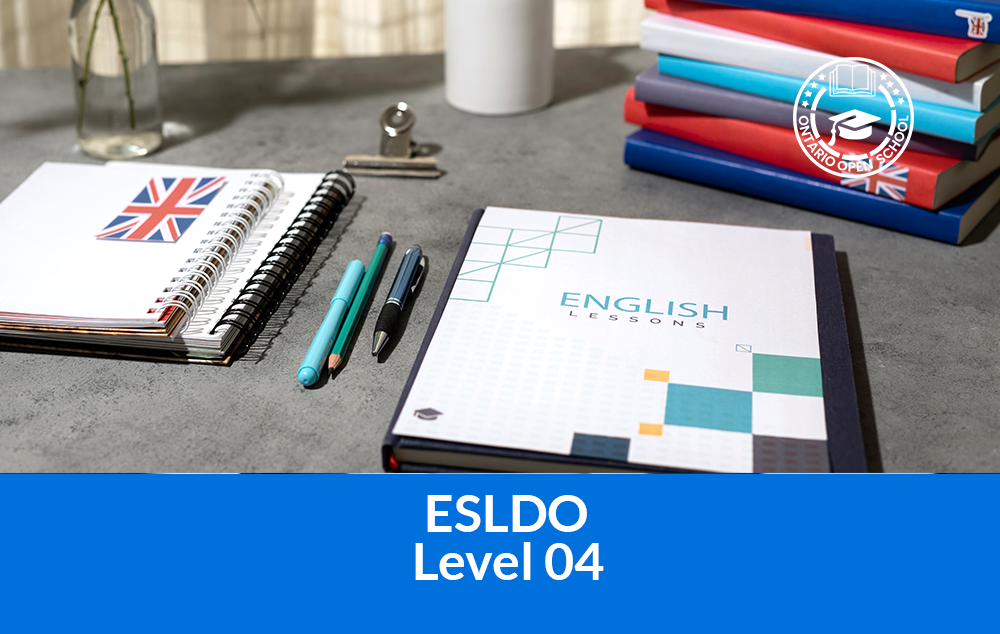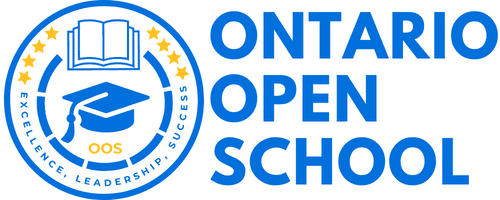- info@ontarioopenschool.com
- 647-494-4499
-
Unit 100 - 29 Gervais Drive, North York, ON.
M3C 1Y9
Copyright 2024 Ontario Open School Inc. All Rights Reserved.
This course prepares students to use English with increasing fluency and accuracy in classroom and social situations and to participate in Canadian society as informed citizens. Students will develop the oral-presentation, reading, and writing skills required for success in all school subjects. They will extend listening and speaking skills through participation in discussions and seminars; study and interpret a variety of grade-level texts; write narratives, articles, and summaries in English; and respond critically to a variety of print and media texts.
Unit Order | Unit Name | Suggested Time |
|---|---|---|
| Unit 1 | Drama This unit covers the following strands: Listening & Speaking, Reading, Writing, and Socio-Cultural Competence and Media Literacy. Overall Expectations: 1-3, 5, 7-10, | 27 hours |
| Unit 2 | Short Stories This unit covers the following strands: Listening & Speaking, Reading, Writing, and Socio-Cultural Competence and Media Literacy. Overall Expectations: 1-6, 8-12, 14. | 24 hours |
| Unit 3 | Novel Study This unit covers the following strands: Listening & Speaking, Reading, Writing, and Socio-Cultural Competence and Media Literacy. Overall Expectations: 1-12. | 24 hours |
| Unit 4 | Media/Culture This unit covers the following strands: Listening & Speaking, Reading, Writing, and Socio-Cultural Competence and Media Literacy. Overall Expectations: 1-4, 6-8, 10, 14. | 27 hours |
| Final Evaluation 30% | Summative Evaluation Final Exam This unit covers the following strands: Listening & Speaking, Reading, Writing, and Socio-Cultural Competence and Media Literacy. Overall Expectations: 1-15 | 6 hours 2 hours |
| Total | 110 Hours |
A variety of strategies are used to allow students many opportunities to attain the necessary skills for success in this course. The teacher uses a variety of whole class, small group and individual activities to facilitate learning. The following is a list of specific teaching/learning strategies that the teacher may use but is not limited to:
Purpose
The primary purpose of assessment is to improve student learning. Assessment relates directly to the expectations for the course.
A variety of assessments for and as learning are conducted on a regular basis to allow ample opportunities for students to improve and ultimately demonstrate their full range of learning and for the teacher to gather information to provide feedback. Assessment tasks relate to the success criteria set out in lesson plans. Success criteria allow students to see what quality looks like.
Evaluation is the process of judging the quality of student work in relation to the achievement chart categories and criteria and assigning a percentage grade to represent that quality. Evaluation is based on gathering evidence of student achievement through:
Assessment for Learning – we provide feedback and coaching. Assessment FOR Learning is the process of seeking and interpreting evidence for the use of learners and their teachers to decide where the learners are in their learning, where they need to go, and how best to go there.
Assessment as Learning – we help students monitor progress, set goals, reflect on their learning
Assessment AS Learning is the process of the explicit fostering of students’ capacity over time to be their own best assessors, but teachers need to start by presenting and modeling external, structured opportunities for students to assess themselves.
Assessment of Learning – we use assessments to provide evaluative statements about student achievement. Assessment OF Learning is the assessment that becomes public and results in statements of symbols
(marks/grades/levels of achievement) about how well students are learning. It often contributes to pivotal decisions that will affect students’ future.
Students passing courses will be marked according using the following four levels of achievement:
Level R (<50%) will be used to indicate students who are performing below the provincial passing standard for a course.
ASSESSMENT TOOLS
Unit 1 –Drama
Specific Expectations
Listening and Speaking: 1.1, 2.1, 2.3, 3.1, 3.3
Reading: 1.1, 1.2, 1.5, 2.1, 2.4, 3.1, 3.3, 4.1, 4.2
Writing: 1.1,1.3, 2.1, 2.2, 3.1, 3.2, 4.3, 4.4
| Assessment For Learning (AFL) | K/U | T | A | C |
| Grammar Worksheets | ||||
| Class discussion | ||||
| Homework | ||||
| Think/Pair/Share | ||||
| Assessment As Learning (AAL) | ||||
| Self-Assessment | ||||
| Peer-Assessment | ||||
| Assessment Of Learning (AOL) | ||||
| Drama Presentation | ||||
| Script | ||||
| Test | ||||
Unit 2 – Short Stories
Specific Expectations
Listening and Speaking: 1.1, 2.1, 2.3, 3.1, 3.3
Reading: 1.1, 1.2, 1.5, 2.1, 2.4, 3.1, 3.3, 4.1, 4.2
Writing: 1.1, 1.3, 2.1, 2.2, 3.1, 3.2, 4.3, 4.4
Socio-Cultural Competence and Media Literacy: 1.1, 1.2, 2.3, 3.3 1.2. 2.3
| Assessment For Learning (AFL) | K/U | T | A | C |
| Grammar Worksheets | ||||
| Class discussion | ||||
| Exit Cards | ||||
| Homework | ||||
| Think/Pair/Share | ||||
| Grammar Worksheets | ||||
| Class discussion | ||||
| Homework | ||||
| Assessment As Learning (AAL) | ||||
| Conference | ||||
| Entrance Cards | ||||
| Self-Assessment | ||||
| Peer-Assessment | ||||
| Exit Cards | ||||
| Assessment Of Learning (AOL) | ||||
| Short Stories Presentation | ||||
| Short Story Writing Assignment | ||||
| Test | ||||
Unit 3 – Novel Study
Specific Expectations
Listening and Speaking: 1.1, 2.3, 3.1, 3.2, 3.3
Reading: 1.1, 1.2, 2.1, 2.2, 2.3, 2.4, 3.1, 3.3, 3.3, 4.1, 4.2
Writing: 1.1, 1.3, 2.1, 2.2, 3.1, 3.2, 4.1, 4.3, 4.4, 4.5
Socio-Cultural Competence and Media Literacy: 1.1, 1.2, 2.3
| Assessment For Learning (AFL) | K/U | T | A | C |
| Literature Circles | ||||
| Think/Pair/Share | ||||
| Homework Check | ||||
| Reading Comprehension Questions | ||||
| Journal Writing | ||||
| Grammar Worksheets | ||||
| Assessment As Learning (AAL) | ||||
| Observation | ||||
| Peer-Editing | ||||
| Assessment For Learning (AFL) | ||||
| Test | ||||
| Essay | ||||
Unit 4 – Media/Culture
Specific Expectations
Listening and Speaking: 1.1, 1.2, 2.2, 3.1, 3.2, 3.3
Reading: 1.1, 1.2, 1.3, 1.4, 3.3, 4.1, 4.2, 4.3
Writing: 1.1, 1.3, 2.2, 3.1, 3.2, 4.4
Socio-Cultural Competence and Media Literacy: 1.2, 2.3, 4.1, 4.2, 4.3
| Assessment For Learning (AFL) | K/U | T | A | C |
| Think/Pair/Share | ||||
| Four Corners | ||||
| Grammar Worksheets | ||||
| Class Discussion | ||||
| Assessment As Learning (AAL) | ||||
| Co-created Rubric | ||||
| Journal Entries | ||||
| Peer-Assessment | ||||
| Co-created Rubric | ||||
| Assessment Of Learning (AOL) | ||||
| Media Works Culminating Activity | ||||
| Test | ||||
Resources
English Yes! Level 3: Beginning Student Text: Learning English Through Literature (McGraw-Hill)
English Yes! Level 4: Intermediate A Student Text: Learning English Through Literature (McGraw-Hill)
English Yes! Level 5: Intermediate B Student Text: Learning English Through Literature (McGraw-Hill)
Language Handbook: Support for the Language Handbook, Harcourt Education (Holt, Rineheart and Winston)
Growing Success: Assessment Evaluation and Reporting in Ontario Schools, First Edition Covering Grades 1-12
Grading
Weighting of categories
| Knowledge/Understanding | Thinking/Inquiry | Communication | Application |
| 25% | 25% | 25% | 25% |

Course Grade | ESL |
|---|---|
Course Code | ESLDO |
Course Category | English As a Second Language (ESL) |
Course Type | Open |
Course Delivery | Online |
Course Duration | 110h |
Course Credit | 1.00 |
Copyright 2024 Ontario Open School Inc. All Rights Reserved.
